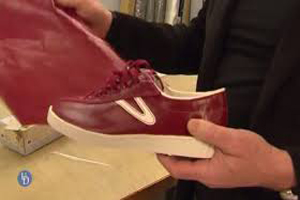
Eco leather-like material being made from combination of natural fibers
YarnsandFibers News Bureau 2014-01-27 17:15:00 – New YorkRichard Wool, director of the Affordable Composites from Renew Resources (ACRES) program at University of Delaware Chemical Engineering (UD) is working with his team to develop a breathable yet water resistant leather-like substitute dubbed “Eco-Leather,†made from a combination of natural fibers like cotton and flax with plant oils.
According to Wool, developing a leather substitute manufacturing facility in Delaware could be an economic boon by providing a new option in the half-trillion dollar leather and fashion markets.
The material has already drawn interest from fashion companies like Nike and Puma for uses in shoes and handbags as well as automotive manufacturers for vehicle interiors.
It would be able to seize their ivory tower inventions which they have patented and be able to scale them up at their STAR campus, green materials center, said Wool. “[They will] be able to demonstrate to the outside world that Delaware indeed has these unique materials.
According to Senator Tom Carper, who visited Wool’s lab on Friday. If [Delaware] can get their foot in the door first, they can not only have the technology but the manufacturing as well.
The material has led to a one-of-a-kind collaboration between the ACRES program and U-D’s Fashion and Apparel Studies department. They’re working together on footwear prototypes which have drawn interest from companies like Nike and Puma.
Wool says that Eco-Leather could be a major catalyst within the fashion industry.
Discoveries like they have done with the Eco-Leather type materials could be a real breakthrough in terms of accelerating that growth. Its a great collaboration between the chemical engineering and fashion departments. Great things can come out of multidisciplinary collaborations.
The leather industry is cited as one of the world’s top environmental offenders due to the amount of chemical waste produced in the leather tanning process process.
Wool’s says that UD’s STAR campus will play a vital role in Eco-Leather’s future by providing a space for labs, pilot production plants, and possibly start-up companies that will develop it in scale.
Some companies are already pressuring Wool to allow the manufacture of Eco-Leather overseas, but he would rather wait to try and establish the industry in Delaware.
That might be a faster route economically for us, but it’s not going to benefit the students or the state of Delaware, said Wool. Last month, Wool won the EPA’s Presidential Green Chemistry Challenge award for the work he has done in the field of green material research.
Wool and his team have also developed a variety of other green products like roofing materials and circuit boards made out of feedstocks and chicken feathers.
A University of Delaware Chemical Engineering professor is making new eco-friendly materials that could revolutionize the leather industry.
Market Intelligence
Ask for free sample Report

experience
Customer Base
dedicated team
Countries Served Worldwide









